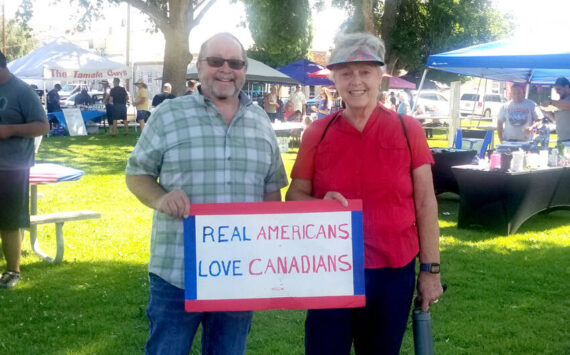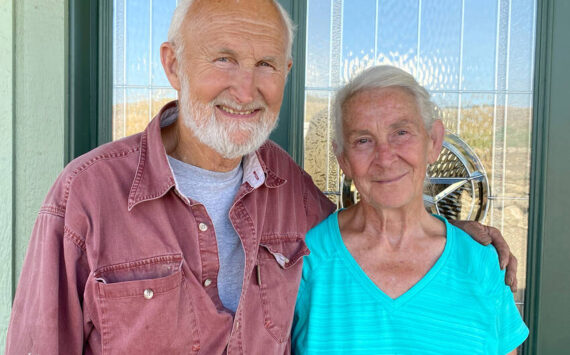Hospital shows profit through end of February
TONASKET – The North Valley Hospital District’s financial situation is gradually improving, reported Chief Financial Officer Helen Verhasselt at the Thursday, April 11, NVH Board of Commissioners meeting.
Verhasselt compared the hospital’s financial condition in a number of areas compared to a year ago:
- Net income for the district through the end of February is about $196,000. Last year showed a loss of $321,000, a swing of more than a half million dollars. The hospital itself is showing a net profit of $330,000, while the Long Term Care division shows a loss of $134,000.
- Compared to the budget, net revenue is over budget by about $95,000, operating expenses are under budget by $192,000. Net income is over budget by about $128,000.
- On the balance sheet, the Accounts Receivable shows an improvement in collection of payments by about $800,000 compared to the same time last year.
“We had some CPSI (rural hospital specialist) consultants here (Thursday),” Verhasselt said. “They were looking at our Accounts Receivable side and said ours were looking better than any facility they’ve been at. They commended us highly.”
- Accounts payable waiting to be paid has been decreased by about $350,000 from the same point last year.
- Registered warrants owed to the county are down $240,000 from the same point last year, but down $1.3 million from August.
- Wages and benefits have decreased by about $98,000.
The warrants stood at $1.7 million on Thursday, up from $1.3 million two weeks earlier, thanks to a number of factors that Verhasselt said were temporary.
“Medicare, a couple times a year, will hold up payments to us for several weeks at a time,” she said. “We’re going through one of those periods right now. They also have a nationwide glitch in their system (that is mistakenly kicking out legitimate charges). So we’ve had a significant cash flow issue with Medicare, which is why we haven’t continued that downward trend.”
She said that expected payments of about $500,000 from Medicare and $270,000 from Medicaid will go directly into paying down the warrants.
“Our warrants and our other liabilities are down,” Verhasselt said. “We’re looking way better. Some people would like quicker progress – like me – but the decisions we’ve made have us moving in the right direction.”
CEO Reports
CEO Linda Michel, who attended the meeting by phone, submitted a written report that included a number of key findings about the North Valley Hospital district’s demographics.
Among the key findings (dated for 2011), culled from a report from the Washington Hospital Association:
- The hospital serves an average of 161 patients per day, an increase of 12.4 percent since 2006;
- The combined Medicare and Medicaid in-patient payer mix was 82 percent. Medicare patients made up 53 percent of the overall mix, up 23.3 percent since 2006; Medicaid was at 29.0 percent, down 23.7 percent;
- Charity care rose by more than 373 percent during that period to $437,574; meanwhile, bad debt for 2011 was $861,271, up 78.8 percent;
- The hospital’s percentage of revenue from the Maintenance and Operations Levy was 2.2 percent in 2011, down 27.4 percent from five years previous.
In terms of patient health status, two key areas where the hospital district varied from state norms included:
- 26.8 percent were classified as current smokers, as opposed to 16.0 percent statewide;
- 14.7 percent received inadequate prenatal care (fewer than four visits, or care started during the third trimester), significantly better than the state’s rate of 25.3 percent.
“During March,” she wrote, “our time was mostly spent on preparing for litigation and our annual audit by DZA (Dingus, Zarecor and Associates, PLLC). We have not seen the report yet but will present that report to the Board when it is complete.”
Space allocation
Commissioner Clarice Nelson reported on the progress of the space allocation committee, which is studying potential uses for the now-closed Assisted Living building.
Nelson said that the district is still waiting to hear about what state-imposed restrictions on space usage might entail, and that the priority as long as the hospital is in warrants is to not spend money on any upgrades.
“We’re looking at some of the ways to save costs to the district, such as having apartments for our physicians, per diem, or VA providers (rather than renting that space elsewhere),” she said. “And we’re looking at our departments that interact with the public and making them more accessible to the community.
“Lots of things are happening in that committee, but it takes some time.”
Attorney discusses public comment
NVH attorney Mick Howe advised the Board of Commissioners that a formal policy regarding public comment at board meetings was needed to ensure that the meetings would be productive.
“The Open Public Meetings act requires that the meetings are open to the public, but one of the most commonly misunderstood provisions … is that it does not allow participation by the members of the public,” Howe said. “That is allowed based upon locally adopted rules or procedures.
“I think that you should consider adopting some strategy or policy that governs how that takes place. Most agencies allow some participation to a limited extent for items that are on the agenda. Public participation is limited to those items and generally limited in time and scope. If you want to go beyond that, I think you ought to consider a policy that disallows harassment or harassing-type comments.”
He said, referring to a summary of public meeting laws published in the Municipal Research and Services Center, that there was nothing that required the board to allow derogatory comments to be made during its meetings.
“I didn’t understand the group we were dealing with until we were actually in court, and actually witnessed the bailiff of the court having to summon the county sheriff to the court room,” he said. “I mean, that doesn’t happen very often.
“In light of that, we really ought to adopt a policy and procedure that puts some rules into place so that we can have an orderly board meeting and not be subjected to the kinds of behavior that we saw.”
Howe added that he felt some of the comments at previous meetings flew in the face of the democratic process.
“You members of the board were elected by the voters of this hospital district,” he said. “You were elected to do this job. That’s (elections) the process for removing you if there’s going to be a removal. You saw where the recall process went. That’s another avenue that’s available. But to come in in a harassing way and ask that you all resign, I don’t think accomplishes anything.”
Commissioner Lael Duncan agreed to formulate a policy that she would forward to Howe to evaluate.




